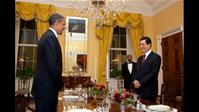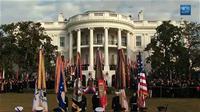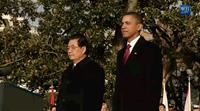On the way to socialist democracy
Adelina Marini, January 20, 2011
 Interesting times are ahead of us as one of the biggest economies in the world, and for sure the fastest growing - China - will try to prove the possibility of a Third Way. The main target of the Chinese society continues to be the development of a socialist democracy. But how this aim can be inscribed into the relationship with the capitalistic and non-socialist democratic (through direct elections) world it is not very clear. Anyhow, China is determined to continue its state policy of opening-up, according to the interview which Chinese President Hu Jintao gave for the newspapers The Washington Post and The Wall Street Journal on the eve of his visit to Washington, which started on January 18th and will continue for 4 days.
Interesting times are ahead of us as one of the biggest economies in the world, and for sure the fastest growing - China - will try to prove the possibility of a Third Way. The main target of the Chinese society continues to be the development of a socialist democracy. But how this aim can be inscribed into the relationship with the capitalistic and non-socialist democratic (through direct elections) world it is not very clear. Anyhow, China is determined to continue its state policy of opening-up, according to the interview which Chinese President Hu Jintao gave for the newspapers The Washington Post and The Wall Street Journal on the eve of his visit to Washington, which started on January 18th and will continue for 4 days.
All foreign companies in China are Chinese
One of the major issues the two newspapers raised in their joint questions to Beijing are of great importance to a large part of the Western world like, for example, despite the continuous growth of foreign investment in China, some American companies (not just American, by the way) had complained about China's business climate. As euinside wrote recently, the problem generally consists of discriminatory attitudes toward foreign companies and, most of all, towards their intellectual property.
To this question Mr Hu responds that foreign direct investments (FDI) are an important part of China's opening-up. "All foreign companies registered in China are Chinese enterprises. Their innovation, production and business operations in China enjoy the same treatment as Chinese enterprises", Hu claims in his interview, thus reiterating the state position, expressed by premier Wen Jiabao too. Further in his responses, the Chinese president points out that his country will continue to implement a pro-active fiscal and cautious monetary policy, will accelerate economic restructuring, "vigorously strengthen indigenous innovation", make good progress in energy conservation and pollution reduction, continue to deepen reforms, etc.
The key word here is "indigenous innovation", because not few western companies complain that China often forces them to transfer their intellectual property to their Chinese partners in return for market access. Something, which is obviously being denied by Chinese leadership.
The economic front of the currency war
It is interesting that, although the currency issues between China and the US  remain unresolved and important, the question of economic partnership and the treatment of foreign investors replaced currency wars from the number one on the agenda. The colleagues from the two influential American dailies raise the currency issues very skillfully by directly asking Mr Hu about his opinion on the future role of the American dollar in the world, as well as whether China wants his national currency, the renminbi, to become an international currency. The answer is very indicative:
remain unresolved and important, the question of economic partnership and the treatment of foreign investors replaced currency wars from the number one on the agenda. The colleagues from the two influential American dailies raise the currency issues very skillfully by directly asking Mr Hu about his opinion on the future role of the American dollar in the world, as well as whether China wants his national currency, the renminbi, to become an international currency. The answer is very indicative:
"The current international currency system is the product of the past. As a major reserve currency, the US dollar is used in considerable amount of global trade in commodities as well as in most of the investment and financial transactions. The monetary policy of the United States has a major impact on global liquidity and capital flows and therefore, the liquidity of the US dollar should be kept at a reasonable and stable level. It takes a long time for a country's currency to be widely accepted in the world. China has made important contribution to the world economy in terms of total economic output and trade, and the RMB has played a role in the world economic development. But making the RMB an international currency will be a fairly long process".
Of course the bigger and more urgent matter than China's desire his currency to respond to his global influence, is the issue of yuan's exchange rate. Quite expectedly Hu Jintao points out that China has adopted a package to curb inflation, caused both by his fast economic growth and the gradual appreciation of renminbi. This package includes also adjustment of interest rates. Besides, the head of state writes in his answers, Beijing has adopted a managed floating exchange rate regime based on market supply and demand with reference to a basket of currencies. Changes in exchange rate are a result of multiple factors, including the balance of international payment and market supply and demand. "In this sense, inflation can hardly be the main factor in determining the exchange rate policy", Hu underlines.
The other fundamental question which The Washington Post and The Wall Street Journal raise - to what extent political reform is keeping up with the steps of its economic reform - Hu Jintao admits that China continues to be a developing country, in spite of its economic progress. "At the same time, we are keenly aware that China is still the largest developing country in the world and we need to make long and hard efforts if we are to build a moderately prosperous society in all respects and basically achieve modernisation". However, according to the developed world China for several years now has left the terminological shelter of "a developing country" and should take its responsibilities as a developed and prosperous country.
And for those who are devoted to socialist ideas, Mr Hu says that the political restructuring of the country should be deepened in order to meet people's growing enthusiasm to take part in political affairs. "The political restructuring we pursue in China is aimed at advancing the self-improvement and development of the socialist political system. We will continue to expand people's democracy and build a socialist country under the rule of law in keeping with China's national conditions", Hu responds.
The long welcome
This statement of the Chinese president can hardly meet the West's expectations of democratisation and economic liberalisation of the Asian giant. And these expectations are big. Under the title "The long goodbye" (probably after Raymond Chandler) The Economist points out in its forecast for 2011 that this will be the year of the long goodbye with the current Chinese leadership. It is expected President Hu Jintao to step down as party leader in late 2012, and as president in March 2013. Premier Wen Jiabao will leave the Politburo also in 2012 and will step down as premier in 2013.
 Alas, the title of the forecast probably should be changed to "The long welcome of the Chinese socialist state". There are names of possible heirs circulating in the public domain but it is obvious that after almost 10 years in power Hu Jintao and Wen Jiabao would insist their heirs to follow the socialist line which is not that much in contradiction to economic development and the type of the economy, but it is with mentality and vision. And this has an impact on economic ties.
Alas, the title of the forecast probably should be changed to "The long welcome of the Chinese socialist state". There are names of possible heirs circulating in the public domain but it is obvious that after almost 10 years in power Hu Jintao and Wen Jiabao would insist their heirs to follow the socialist line which is not that much in contradiction to economic development and the type of the economy, but it is with mentality and vision. And this has an impact on economic ties.
Nonetheless, every move from now on would have a serious impact because, if until now China was developing quickly and impetuously, and impressed economic analysts with its statistical curves, now each step China makes will echo around the entire globe. No matter what the next leadership in China would be, they will work in an environment of enormous economic power and in a world of over-indebted developed countries and fast developing and emerging markets with thirsty for resources middle class. And the exchange coin of the next decade will be exactly resources, the battle for which has already started some time ago, but is still quiet.